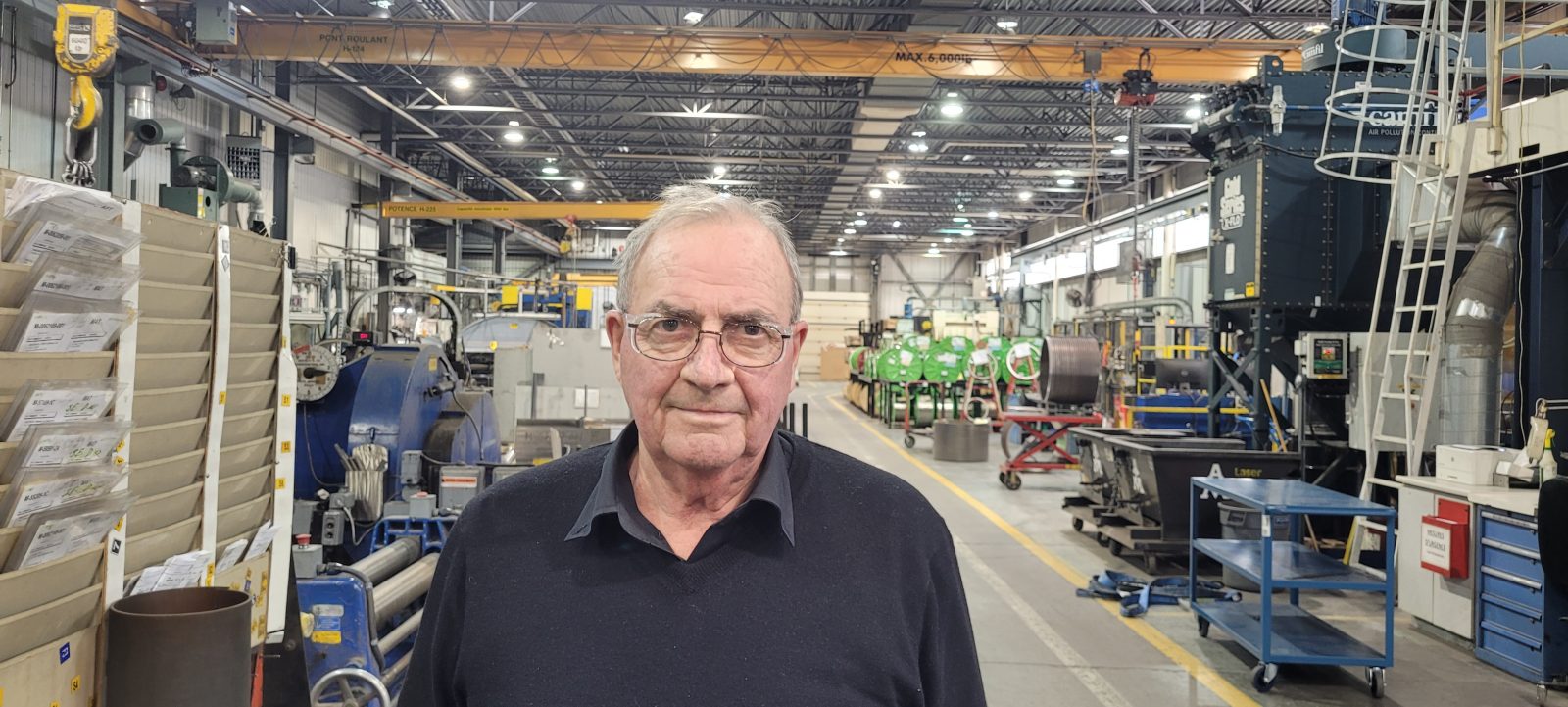By Lawrence Belanger
Local Journalism Initiative
Raymond Matheson has been working at what is now Aikawa Fiber Technologies (AFT) in Lennoxville for just over 50 years, having started working on the factory floor in 1973. His job and position have changed over the last five decades, with Matheson first becoming a supervisor and later manager at the company. A couple years after graduating Galt High School, he started at AFT by chance. “I put my name in for Bell Canada,” as he needed more money than what he could get working on a farm. While applying for that job, he also found out about AFT, and was encouraged to apply there.
“So I came here and I was hired the first day,” says Matheson. He started on the floor seven days later. He remembers being one of 16 or so hires that year, and he says that about 10 of them stayed for 35 or more years. He’s the last of this cohort of hirees.
Matheson started in the factory’s chrome plating and shipping department, before applying to be a drill machine operator. He started work at 7:30 in the morning, until union contracts changed everyone to one of three shifts starting at either 8 a.m., 4 p.m. or midnight. In 1986, he became a floor supervisor on the suggestion from one of the existing supervisors at the time.
“I was a shop supervisor for 24 years,” during which he brought the first computer numerical controls (CNC) to the factory. CNCs use a computer to tell the factory machine what to make, replacing the older method. Matheson explains that “before, they were mechanically driven, with a ratchet and gear.” A gear on the side would control how the solder, the tool that fuses parts of metal together, would move. A CNC machine has a computer that is programmed to instead control the process.
He also brought in their first laser machines in the mid 90s, which are used to cut the steel components made into screen plates, cylinders, and more. He brought in this technology to help the factory’s operations change and grow.
“When I started here, we used to only do the plates [and] cylinders,” explains Matheson. “We didn’t do a finished product.” During the late 1980s, the general manager of the factory came to him and asked him if he thought they could get into the pulp and paper industry. “I suggested we could,” and since then, AFT has been making the machines that are used to make paper and cardboard.
Now, “we’re the biggest supplier in the world of pulp and paper machines,” says Matheson. Besides making pulp and paper machines, AFT’s also does a lot of chrome plating also for CN’s trains, which reduce friction between various parts of the train.
Matheson started when AFT was still operating as USP, becoming CAE Screen plates during his first decades there. In the early 1990s, they bought out competitor Alhstrom, with factories in Finland and Sweden. After “CAE sold us in 1999…we became public.” He says that in 2006, “we were bought by Aikawa,” a Japanese company. Referring to the 90s and 80s, “they were a competitor to us in them days,” explains Matheson.
Currently, he’s in charge of the drafting department. In this role, he supervises AFT’s draftspeople, who produce the technical drawings and specs of the cylinders, plates, and other metal machine parts that the company produces. Additionally, he speaks with AFT’s clients, solving problems with the managers of paper mills.
His job now keeps him off the factory floor for the most part. “I go on the shop floor two or three times a day but I’m working mostly in my office now,” says Matheson, who gets in around 7:50 in the morning each day and stays till 4 p.m.
Matheson has accomplished a lot in his time at AFT. Perhaps most novel is the construction of a large cylinder used to refine paper pulp, which he built in the 1990s for the Beloit Corporation. “It was the biggest [screening] cylinder in the world for a long time,” something he looks back on warmly. His expertise in rotors has earned him the nickname “Mr. Rotor” among the factory workers and other supervisors at AFT’s factories around the world.
In addition to celebrating five decades at the company, Matheson and his colleagues are also recognizing 120 years of operation in Lennoxville, which began as Union Screen Plating (USP) in 1903.
In a comment emailed to The Record, Julie Hébert, human resources coordinator for AFT, praised its customers and employees, stating “we are honored to celebrate this important milestone and are grateful to everyone who has helped make our company what it is today.”



